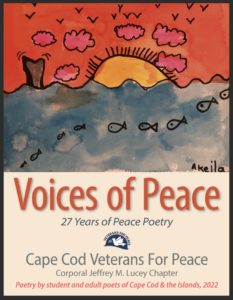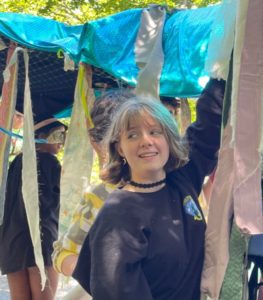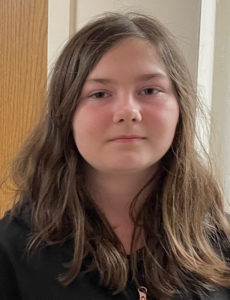In her poem “Peace,” Ana Maldacker, a seventh-grade student in the Provincetown Schools’ International Baccalaureate program, describes an image of loss:

An empty carriage in a town square, as a reminder of a child who will never be there
The image of the carriage, emptied by war, materializes and dematerializes at nearly the same time, the “there” surrounded by white space — hovering, detached, nowhere. How can peace be imagined at such a moment?
That is a hard question, one that Ana confronts with a plea in the last line of the poem: “End this suffering please.”
Ana’s poem is one of five written by Provincetown IB students that have been published in Voices of Peace, an anthology of work by students from schools throughout Cape Cod. Organized by Cape Cod Veterans for Peace, the Voices of Peace Poetry Contest is in its 28th year.
Provincetown English teacher Amelia Rokicki says the principles of Veterans for Peace and the IB program are aligned. “Core to the IB mission is to nurture students in ways that encourage and maintain world peace,” says Rokicki. The statement of purpose of the Cape Cod Veterans for Peace begins “We, having dutifully served our nation, do hereby affirm our greater responsibility to serve the cause of world peace.”
A small group of Veterans for Peace poets who were associated with the Guyer Barn Art Gallery and Center in Hyannis inaugurated the poetry contest in 1995. Their goal was “to link poetry to problems of world peace, security, and human well-being.” For young people, they wrote, poetry provides “an opportunity to honestly express their feelings toward building better relationships, for a better world.”
As Ana’s poem suggests, however, expressing those feelings can be fraught.
Nina Tepper, a retired writing teacher who administers the Voices for Peace program, says the students’ poems “often reflect the issues of our time, from how women see themselves to LGBTQ awareness,” in addition to their own “experiences of abandonment and self-acceptance.” The poems, she says, “imagine the pain of others with sensitivity and compassion.”
Tepper says she is taken with how fully Provincetown has embraced the poetry initiative. “The experiences of veterans, the clarity of children’s vision, and peace overlap and belong together,” she says. “The poems affirm for adults that the future will be in good hands.”
For Rokicki, “the relationship of veterans and peace” is important for her students to understand. Poetry is a rich resource for exploring the paradoxical nature of that relationship in ways both direct and indirect.
Hannah Webster, a poetry fellow at the Fine Arts Work Center in Provincetown, worked with Rokicki’s students during the 2021-2022 school year. With the war in Ukraine at the center of attention, she presented a series of poems to the students. They discussed the poems’ content and forms of expression. Each student then wrote a poem in response.

Lily Elmer, an eighth-grade student, wrote her award-winning poem in response to Ilya Kaminsky’s “We Live Happily During the War,” which explores the poet’s complicated feelings observing the war in his parents’ homeland from the comfort of his American home. “When they bombarded other people’s houses,” he wrote, “we protested, but not enough.”
In her own poem, “Advice to Kaminsky,” Lily speaks to the poet directly:
Your concern is real,
And that’s what matters.
Caring and being unable
To make an action towards a cause,
Is better than not caring
For it at all.
You’re already a step ahead.
“Thalassophobia,” an award-winning poem by fifth-grade student Lily Holmes, strikes a different chord in content and form. The title is both a psychological term meaning fear of the ocean and an evocation of the classic Greek divine female personification of the sea. The fear of the ocean is embodied in the figure of a sea serpent, which, as Lily explains, “We can imagine any way we want.”

Deep in the sea,
So down deep,
Lies the fateful serpent.
You’re so far down,
You can’t even drown,
It’s getting hard to breathe.
Then you don’t see,
As he is me.
Slowly constricting,
And I’m so uplifting,
As I bite down hard.
For Nina Tepper, the Voices of Peace program “is one of the proudest projects I’ve ever been a part of.” The students reading their poems at the awards ceremony held each April at the South Congregational Church in Centerville “are probably the most moving experiences I’ve ever had,” she says.
And they are often a surprise for the students themselves. “I was shocked when I won a prize,” says Lily Elmer. “It was pretty nice.”
Unfortunately, the awards ceremony has not been held since 2020. During next April’s Poetry Month, however, student poets, veterans, teachers, parents, and citizens from around the Cape will gather once again in Centerville to hear student voices in a celebration of community and peace.
For more information on the Voices for Peace program, and to read the 2022 anthology online, see vfpcapecod.org.
